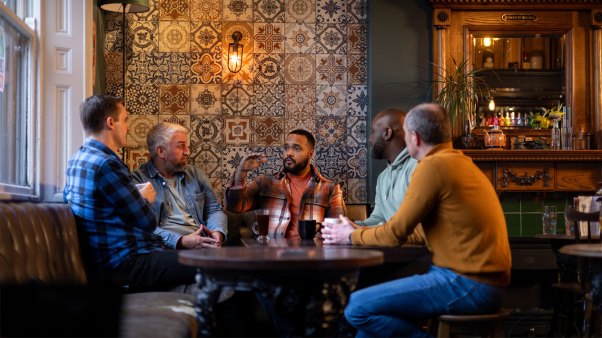In 2015, more than 44,000 Americans died by suicide—one death every 12 minutes, as the Department of Health and Human Services put it. The overall suicide rate has grown by nearly 30 percent over the past 15 years, prompting some to call it a new public health crisis.
Al Hsu knows this reality personally. Nine months after the InterVarsity Press senior editor got married, he received a phone call from his mother. “Daddy killed himself,” she told him. When he heard the news, Hsu and his wife already had plans to visit his parents. His 58-year-old father was in rough condition after a stroke had left him partially debilitated and gravely depressed. The aftermath of his father’s death sparked Hsu to reflect and research, the results of which found their way into Grieving a Suicide: A Loved One’s Search for Comfort, Answers, and Hope (InterVarsity Press), first published in 2002 and re-released this year.
Hsu spoke with assistant editor Morgan Lee about the inner conflict of grieving a suicide, the best and worst ways his community responded to his pain, and whether ending one’s own life condemns a Christian to hell.
What is it like to lose someone you love to suicide?
Counselors call this kind of grief a complicated grief or a complicated bereavement because grievers are actually dealing with two realities: grief and trauma. The grief of losing a loved one is normal and expected, but with suicide comes trauma. In processing a suicide, there is no easy path to peace and the grief journey cycles through all sorts of different feelings and emotions.
So it’s important to realize that this grief will strike you in many different ways.
Right. For grievers, there are any number of emotions that are common, whether it’s anguish, pain, or survivor’s guilt and shame. Those who have lost a loved one to suicide often feel at fault. Why didn’t I see this coming? Why didn’t I do something to prevent it? So they feel guilty that they weren’t able to stop it. This is something wrong about my family, something wrong about my loved one, and I don’t want to talk about it because it’s shameful.
We also feel conflicted because if it had been a murder we could rage against the murderer. But in this case, the murderer is the loved one, so we grieve him and rage against him at the same time, leaving us conflicted and exhausted. This anger is normal, and we shouldn’t try to shut it down. But we have to beware more self-destructive responses to a loss. Some grievers turn to alcohol or drug use, while others may actually try to reenact their loved one’s steps. They may stand holding a gun looking in the mirror or on a balcony ledge, trying to figure out what was going on in their mind. We need to be careful of these self-destructive responses and have our community keep an eye on us.
How did your community reach out to you after your father’s suicide?
We had only been attending our church less than a year, but my pastor at the time and his wife drove seven hours to Minnesota (from Illinois) to come to the funeral. That was a tremendous statement of mourning with those who mourn and grieving with those who grieve.
The most helpful people were those present with us who didn’t seek to give us pat answers and quick fixes. Statements and questions like “Tell me about your father” or “What do you want to remember about him?” help the griever reflect on the life and—not just the death—of the loved one.
Those who offered verses like Romans 8:28 or said that “God has a plan,” while well-intentioned, felt painful. One relative gave the “If it doesn’t kill you, it makes you stronger” line. However, what I heard was, “Your dad wasn’t strong enough to handle his stroke and depression, so he took his own life.” What was meant as a well-intentioned “You can handle this” sounded more like “Your dad couldn’t handle it.”
Do Christians who die by suicide go to hell?
Christians often assume that suicide is an unforgivable sin and that those who die by suicide automatically go to hell. That’s a misconception that believes in a transactional view of sin and forgiveness, where if we don’t confess the sin of suicide after it takes place, it can’t be forgiven. But that idea comes more from Augustine and medieval theology than the Bible. Scripture doesn’t actually say that suicide separates us from God for eternity. The unforgivable sin is never equated with suicide in Scripture. Somebody like Samson died at his own hand, but he’s still included in Hebrews 11 among the Hall of the Faithful. And there’s the promise in Romans 8 that “neither life nor death,” not even death by suicide, could “separate us from the love of God in Christ.”
I was on a radio show recently where one caller said, “I’ve always believed that suicide automatically sends you to hell, and that has prevented me from killing myself. Now I’m confused because if you tell me that suicide doesn’t automatically send you to hell, doesn’t that let people off the hook?”
I said something along the lines of, “Well, suicide is never held up positively in Scripture. There are seven suicides in Scripture from King Saul to Judas, and they’re always depicted negatively. They are never God’s plan for anybody’s life. But it’s also not the unforgivable sin that automatically condemns somebody for eternity.”
I put suicide in the literary category of tragedy. In Greek or Shakespearean tragedy, somebody is undone by an internal fatal flaw, and the tragic hero dies because something has gone wrong in their story. When we think of that and our loved ones that we lost in suicide, that helps us understand them. It doesn’t excuse their action, but it helps us have compassion on and empathy for them.
What’s your advice for talking to children when a loved one dies by suicide?
In many cases, families try to cover up the truth to “protect” the children. Young kids may not understand why a parent has taken their own life, and so the temptation is to couch it in terms like, “Oh, there was an accident” or “Mommy didn’t mean to take those pills.” That might work for a little while, but inevitably the kids grow up and hear the full story from somebody who doesn’t know that they weren’t supposed to talk about it. Not only does this launch them into grieving the loss of their parent dying in this way, they also feel betrayed by those who have covered it up. It’s better to speak candidly but in age-appropriate ways to kids to help them understand: Mommy felt that she could not go on living. Her feeling was like an illness or disease that prevented her from seeing hope for the future. She felt like she couldn’t go on.
We should reassure children that they are not at fault. Young children are particularly egocentric, and they often think they caused something. So we need to reinforce: “It was not your fault that Mommy or Daddy did this. They are responsible for their own actions.”
Since this book’s first release, how have your own beliefs, thoughts, and feelings about suicide changed?
I grieve a little differently now as a 40-something than I did as a 20-something. I experienced the initial grief as a 20-something losing his dad. Now, almost 20 years later, the grief changes, and I grieve him as the grandfather that my sons have never known. I regret all the conversations we didn’t have over the years.
What strikes me is that suicide is so common. The Centers for Disease Control and Prevention said last year that suicide rates have increased by some 24 percent over the last 15 years in almost every demographic category. Each suicide leaves behind, on average, 6 to 10 people—children, parents, spouses. That’s hundreds of thousands of people that are going through this loss every year.
Suicide has touched lots of people, and we’re not always aware of its prevalence until it happens. Unfortunately, then people are surprised by it and feel like they’re alone. They need to know there are others that have gone through the same experience.
Many people who die by suicide are middle-aged white men. What do you make of that?
As far as middle age goes, studies show that the loss of economic productivity is a big factor in suicide. However, untreated depression is the number one cause of suicide. Some studies say that about two-thirds of suicides involve depression.
There’s almost always a multiplicity of factors that lead to a suicide. For middle-aged people who face limitations in career, health, or economic opportunity, these struggles can compound on each other. It can lead people to a place where they think their best days are behind them and don’t see hope for the future, leaving them at greater risk for suicide.
When it comes to suicide, are there preventative measures we can take?
Karen Mason’s book Preventing Suicide argues that people who are thinking about suicide want to be rescued. They may not always articulate it, but the people experiencing suicidal ideation are often torn between the desire to die and the desire to live. When the desire to die outweighs the desire to live or exceeds their capacity for coping mechanisms to handle their pain, that’s when suicide takes place.
But suicide can be prevented with resources, communities, support, and counseling. Therapists and counselors say you can either reduce the pain or increase the capacity to cope with pain. This can be done through counseling, therapy, medicine, or antidepressants.
The church should not be afraid of psychology or medicine. Sometimes Christians think, Oh, that’s unspiritual. If we just believe or pray more, then we’d be able to heal this. But, no, these are ways that the church can minister to one another. God gave us people who are researchers and understand medicine, brain chemistry, and neuroscience. The better we understand these things, the better we can help one another. Just as we would not think it unspiritual to medically heal somebody for cancer or leukemia, it’s okay to provide treatment for depression and mental illness.
What brings you hope in this dark conversation?
Suicide rates are increasing. The trends are all heading in the wrong direction for almost every demographic. But if there is a silver lining, it is that the church is now more aware of mental health issues than it was 15 years ago.
In 2013, Saddleback Church pastor Rick Warren and his wife, Kay, lost their son Matthew to suicide. He had had a long history of mental illness, and it was a devastating experience for them. But Kay has since launched Saddleback’s mental health ministry and has done a lot of training for the church to be more aware of these issues. And so as a result, people have been saved from suicide because of their story and helping people be aware of the realities of mental illness.
I’m grateful for the work of people like Kay and Amy Simpson and her book Troubled Minds. There are resources available for the church that did not exist 15 years ago. To the extent that people are more public about the realities of mental illness and suicide, the more we can help those who struggle and save those at risk.
Learn something new from this interview? Did we miss something? Let us know here.










